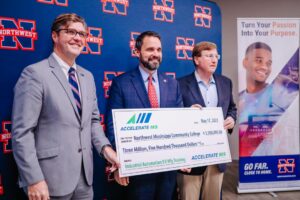Mississippi’s Visionary Blueprint For Workforce Excellence


In an era of relentless innovation where technical skills evolve at an unprecedented pace, finding the right talent with the necessary expertise and adaptability has never been more challenging. The dearth of skilled professionals, particularly in emerging and advanced industries, leaves CEOs struggling with overworked staff and constant turnover, at no small expense.
Against this backdrop, Accelerate Mississippi has emerged as a vanguard, spearheading initiatives in the Magnolia State that are crucial to molding a resilient and proficient workforce, not only to fill immediate gaps but also prepare for the demands of a complex, ever-changing future. “If we can coordinate resources better with a unified strategy that all entities—industry, state offices, educational partners—can get behind, that’s going to allow for a much healthier workforce,” says Executive Director Ryan Miller.
Accelerate Mississippi’s unique strategy for economic development divides the state into eight ecosystems so that the unique needs of each region can be addressed. “Some common denominators exist throughout the state, but we wanted to really understand what challenges and opportunities the Gulf Coast might have versus what Northeast Mississippi might have,” says Miller. “When you get organized in that way, you start to recognize the partners in those regions as well.”

Each ecosystem is headed up by a coordinator who lives locally and who routinely reviews labor market data, supply chain needs, educational and training resources, and regional and community assets. Most importantly, they go out and meet with industry partners. “They’re asking them, what do you think is lacking in our K-12 system as it relates to career readiness, and what kind of school programs do you think would have a positive impact on you, both immediately and in the next several years?”
The work with private industry has grown more robust as companies have become more open to collaborating—from the larger manufacturers like Nissan and Ashley Furniture to the smaller outfits like Hol-Mac based in Base Springs. “More than ever before, private industry is recognizing that for this to be a truly cohesive and coordinated approach, they need to be involved in that discussion.”
Those CEOs, along with policymakers, community organizations and other government entities, have been welcomed to the “ecosystem table” to share their expectations for the state. The result has been the creation of tailor-made training programs that align closely with the skill requirements of businesses.
“We partner with every level of educational pathway and pipeline,” says Miller, pointing to the 15 community colleges that do the bulk of workforce training in the state, four-year colleges and some of the state’s Workforce Innovation and Opportunity Act (WIOA) regions, which train adults for specific skills-based work.
This past fall, Accelerate Mississippi launched a new K-12 microgrant program designed to help career technical education programs throughout the state get funding for new resources, equipment, curriculum and trainers, particularly in CTE programs that are outdated or that might not have a curriculum sufficiently dovetailed with area industry.
Recognizing the imperative to create a workforce that can adapt and grow in tandem with industry, Accelerate Mississippi adopted a visionary three-pronged strategy:
1. Workforce triage. With some industry sectors suffering from a dearth of skilled labor, Miller’s office aims to provide immediate relief by helping companies fill gaps. “All across the country, really globally, there’s a shortage of good people in certain industry sectors,” says Miller. “We want to try to help stop the bleeding.”
2. Customizable training. When a new industry comes to the state of Mississippi, Miller’s group aims to create and develop curricula with training partners that can be deployed quickly to meet that company’s needs. “We want to make sure we have resources deployed to get them from startup to full production.”
3. Horizon thinking. In a collaborative effort with economic development partners, Accelerate Mississippi seeks to identify the industries considering Mississippi, the new technologies that will be coming to the state, whether for new production or for utilization with an existing plants. “If we don’t have training for these technologies yet, we can work to develop that new curriculum and get that deployed quickly so that when those industries arrive, they feel satisfied in knowing that when they get here, we’ll be prepared to handle their needs.”
Together, these strategies form a robust framework that aims to secure Mississippi’s position as a state with a future-ready workforce, making it an attractive destination for business leaders and investors seeking long-term success.

0

1:00 - 5:00 pm
Over 70% of Executives Surveyed Agree: Many Strategic Planning Efforts Lack Systematic Approach Tips for Enhancing Your Strategic Planning Process
Executives expressed frustration with their current strategic planning process. Issues include:
Steve Rutan and Denise Harrison have put together an afternoon workshop that will provide the tools you need to address these concerns. They have worked with hundreds of executives to develop a systematic approach that will enable your team to make better decisions during strategic planning. Steve and Denise will walk you through exercises for prioritizing your lists and steps that will reset and reinvigorate your process. This will be a hands-on workshop that will enable you to think about your business as you use the tools that are being presented. If you are ready for a Strategic Planning tune-up, select this workshop in your registration form. The additional fee of $695 will be added to your total.

2:00 - 5:00 pm
Female leaders face the same issues all leaders do, but they often face additional challenges too. In this peer session, we will facilitate a discussion of best practices and how to overcome common barriers to help women leaders be more effective within and outside their organizations.
Limited space available.

10:30 - 5:00 pm
General’s Retreat at Hermitage Golf Course
Sponsored by UBS
General’s Retreat, built in 1986 with architect Gary Roger Baird, has been voted the “Best Golf Course in Nashville” and is a “must play” when visiting the Nashville, Tennessee area. With the beautiful setting along the Cumberland River, golfers of all capabilities will thoroughly enjoy the golf, scenery and hospitality.
The golf outing fee includes transportation to and from the hotel, greens/cart fees, use of practice facilities, and boxed lunch. The bus will leave the hotel at 10:30 am for a noon shotgun start and return to the hotel after the cocktail reception following the completion of the round.